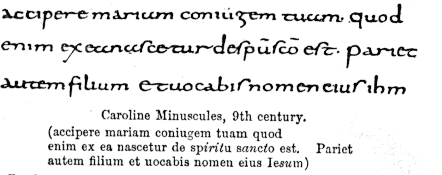Alcuin and Charlemagne
Today, a king and a scholar invent education. The University of Houston's College of Engineering presents this series about the machines that make our civilization run, and the people whose ingenuity created them.
When he was 39, Charlemagne did an odd thing. He invited an English scholar, Alcuin, to his court. Alcuin had been in Europe the year before, and Charlemagne saw that he was very bright. He asked Alcuin to bring learning to the kingdom of the Franks.
Alcuin was 46. That was old in those days. He was a gentle cleric with the best mind around. Charlemagne was worldly and boisterous. But he knew he'd need education to build civilization in the European wilderness. They made quite a pair.
Charlemagne would rise at dawn for his instruction. He went at book-learning like a kid with a new toy. When he'd mastered the great works of St. Augustine and St. Jerome, he asked Alcuin why he couldn't have a dozen or so scholars like that in his own court. "What!" cried Alcuin. "God himself had only those two and you want twelve!"
A fine spirit of play marked their unbalanced roles of student and master, king and servant. Alcuin told Charlemagne to watch his language -- to behave himself. Once he wrote about Charlemagne,
Behold our Solomon, resplendent with the diadem of wisdom ... Cherish his virtues, but avoid his vices.
Charlemagne took it in good grace. Then, after five years of education, he issued the first of three proclamations to all clergy. They too were to take up letters and learning.
The clergy were an uneducated lot. But Charlemagne kept the heat on them. The proclamations were a peculiar fusion of Charlemagne's authority and Alcuin's fine classic prose. They reflected the alchemy of two personalities who shared one vision.
Alcuin retired after 14 years. And when Charlemagne died in AD 814, the empire he'd built died with him. But the bond between Alcuin and Charlemagne had spawned another empire that did not die. For that enforced schooling took root in the monasteries.
Alcuin's ideas about curriculum eventually carried through into the first universities. Your college was the final inheritor of that joyful flight into learning. And we read the third of Charlemagne's proclamations. It's a surprise.
Charlemagne had decreed that all male children should be schooled. Of course that was only a hope, 1200 years ago. For most who were touched by it, it could mean little more than learning to read parts of the catechism.
Still, a wise overgrown schoolboy and a quiet man of books had put their very different heads together. They'd set into motion the most important thing that came out of what we call the Dark Ages. And that was no less than modern education.
I'm John Lienhard, at the University of Houston, where we're interested in the way inventive minds work.
(Theme music)
West, A.F., Alcuin and the Rise of the Christian Schools. New York: Charles Scribner's Sons, 1892, 1909.
Howell, W.S., The Rhetoric of Alcuin and Charlemagne. New York: Russell & Russell, Inc., 1965.
See also many available biographies, historical and literary discussions, and encyclopedia articles on Alcuin. I am grateful to Professor Sally Vaughn, UH History Department, for her critical help with this episode.
O quam dulcis vita fuit Oh how sweet life became
dum sedebamus in quieti When we sat together in quiet
...
inter liborum copias. Midst all these books.
Alcuin

From the 1897 Encyclopaedia Britannica
Example of the distinctive "Carolingian" script developed in Charlemagne's court -- a side-effect of Alcuin's influence. This script was the forebear of our modern lower case letters